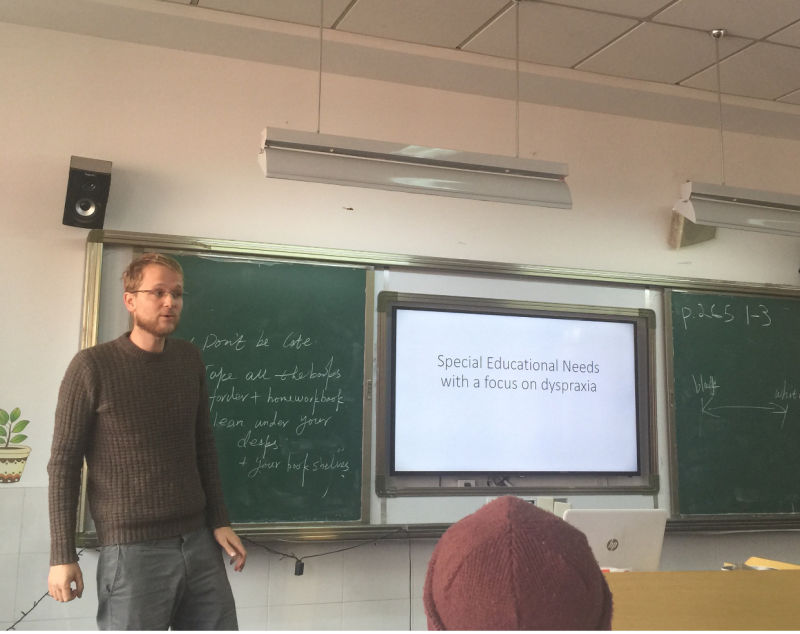【Special Educational Needs】他們比你更需要!
2016-12-14 Griff Pryce
你不知道,有些孩子真的好辛苦!
自閉症!
閱讀障礙!
運動困難!
如惡魔般糾纏著他們幼小的心靈!

但是,你更不知道,西外初中雙語國際課程部的外教Griff Pryce正在研究這方麵的問題(這也是他的專業),為了幫助這些小孩找回自信,讓笑臉在他們臉上重新洋溢!
冷嘲熱諷的舊思維
最近,世界開始變得糟糕,差異不被認同和欣賞。用左手寫字的小孩會被打;在拚寫、書寫和組織方麵有困難的學生經常被貼上傻子的標簽,並推向生活的邊緣。
現在,有一個研究機構,旨在界定特殊教育需要,通過有針對性的教學,使我們能更好的理解學生的困難,並幫助他們克服困難。
隨著人類的進步,我們正朝著對有精神困境和身體障礙的人“同樣尊重”的方向發展。
觀點
特殊教育越來越被需要

特殊教育需求
特殊教育需求(SEN)是和每一個教育機構相關且有趣的討論話題。無論是社會的最底層成員,還是使我們邁向更大進步的天才,都有一部分人需要特殊教育的幫助。在西外,從能力最基本的學生到最優秀的學生,都有人在某些具體問題上需要額外的幫助,如運用障礙,閱讀障礙,多動症和自閉症。如果這些問題不適時處理,可能會衍生其他問題甚至升級為更嚴重的問題。
在英國,專家可以一些方法來確定學生是否有特殊教育需求(SEN),他們需要怎樣的幫助。2016年,英國有2.8%的學生被評估為至少表現出一項SEN。他們得到的額外幫助包括25%的額外考試時間、在課堂上使用筆記本電腦或有一個抄寫員幫助他們在課堂上做筆記。在這份報告中,我將重點放在閱讀障礙、運動障礙和自閉症上。我將討論這些問題和一些我們可以幫助學生管理和克服這些困難的方法。

運用障礙症缺乏良好的運動技能、協調和組織能力
1笨拙但聰明
運用障礙患者經常被描述為“笨拙但聰明”。他們往往書寫很慢,字跡難以辨認。但許多患者都培養出了優秀的聽覺和口頭表達的技能,以彌補他們在書寫上的不足。我想起一個我們學校的學生,種種跡象表明他可能患有“運用障礙症”。他被分在程度較好的A班,對於課堂內容有較好的理解能力,經常參與課堂討論。但他的書寫卻非常糟糕,導致他在課堂上的產出非常少。對於這樣的學生,我們可以找出他們的問題,並為他們提供有針對性的教學。例如,指導他們如何在有橫線的本子上或者白紙上把字寫得均勻一些。如果他們的書寫仍未得到改善,可以效仿英國的學生,使用電腦來做功課,這也是未嚐不可的。
2缺乏組織能力
缺乏組織能力的“運用障礙症”患者可以受益於一些特定的課程訓練,這些訓練會教他們如何整理書籍,帶老師指定的學習用品到學校,以及如何自主地安排學習。同時他們還需要提高協調能力。而對於年紀小的患者來說,最好的治療方法是在玩樂中提高協調能力。如果方法使用得當,很多孩子可以走出“運用障礙症”的陰影。

3“運用障礙症”患者往往有特殊技能
“運用障礙症”患者往往在其他方麵擁有令人驚訝的技能。一個案例研究描述了一個女患者,她過度飲食的、自尊心很低下、必須非常努力才能保住自己的工作。但是除此之外,她是一個非常優秀的長笛演奏家。這個鼓舞人心的案例表明,通過正確的訓練,患者可以發展他們的技能,達到專業的水平。例如,患者們可以通過包括接球和拋球在內的玩樂方式來提高自信心、加強協調力。攝影也是任何一個SEN學生都可以用來更好地表達自我的方法。作為教師,我們可以鼓勵患有該症的孩子發展他們的技能。
運動障礙的常見症狀
運動技能差:筆記潦草、打字慢、亂食
生活問題: 失業、肥胖 、淩亂的個人生活
無組織性:健忘,衝動
特殊技能:說話和寫作方麵用詞簡潔。具有良好的處理詞彙的技巧。在音樂、弓箭方麵有驚人的天賦。
1閱讀困難
 患有閱讀障礙症會使得孩子非常沮喪。
患有閱讀障礙症會使得孩子非常沮喪。
當一個孩子開始上學,並更多地專注於學習如何讀和寫的時候,閱讀困難的跡象通常會變得明顯。
患有閱讀障礙的人可能:
-讀寫很慢
-混淆字母的順序
-把字母的方向寫錯,如把“b”寫成“d”
-拚寫錯誤
-口頭告知他們信息時,他們比較容易接受,但是對於書麵信息卻很難理解
-很難執行一係列的指令
-在計劃和組織事物上有困難
1自閉症

自閉症是我要討論的最後一個特殊的教育需求。患有嚴重自閉症的孩子會發現他們可能不能連貫的講話或上主流的學校。然而,患有自閉症的學生進入主流學校還是很普遍的。這些學生有艾斯伯格綜合症,共同的行為特征包括強迫症狀、重複性和社交困難。在某些情況下,他們的強迫性可以加以利用。許多偉大的科學家和數學家都患有自閉症。比爾蓋茨是一個自閉症患者,他也曾經是世界上最富有的人。然而,自閉症可能會給患者在社會生活中帶來嚴重的挑戰。他們會發現很難理解別人的意思、手勢和麵部表情。有時,他們可以受益於帶指示性的緩慢而清晰的交談。
SEN
特殊教育需求(SEN)提供了一個有用的框架,我們認識到我們的學生的需求,並采取係統的措施去幫助他們。大多數的英國學校現在常見的做法是設置一個特殊教育需求中心(SEN UNIT)。隨著西外的發展,我認為設置一個特殊教育需求中心是有益處的。這是一個獨立的部門,學生可以在除了常規的課程之外的時間參加這個中心的課程,讓這些課程對常規課程學習有幫助。此部門也可用作學校的輔助部門。在這裏,特殊教育專家們會幫助學生在一個安全的環境中建立自己的信心,並通過各種方式練習他們的技能。如果有特殊的需求,認知行為療法(CBT)和輔導可以幫助學生處理任何程度較重的情感問題。一個特殊教育需求中心會使這些有此需求的孩子受益。
Special Educational Needs
Griff
Special Educational Needs (SEN) are a relevant and interesting topic for discussion in every educational institution. From the most downtrodden members of our society to the geniuses that light the path forwards towards our greater progress, there is a proportion of people with special educational needs. Within Xiwai, from the lowest set to the highest achievers, there are students who require extra help with specific problems. Problems like dyspraxia, dyslexia, ADHD and autism spectrum disorder. Sometimes these problems can escalate into greater and related problems if they are not dealt with at a young age. In the UK, a specialist can determine whether a student has a SEN and what help they will require. In 2016, 2.8% of students in the UK were ‘statemented’ with at least one form of SEN. Students are given extra help that can include 25% extra time in exams, using a laptop in class or they may be given a scribe to help them to take notes in class. In this report, I am going to focus on dyslexia, dyspraxia, and autism spectrum disorder. I am going to discuss these problems and some of the many ways that we can help students to manage and overcome these difficulties.
 Dyspraxia is a problem with fine motor skills, coordination and organisation. Dyspraxics are often described as ‘clumsy but clever’ though no two dyspraxics are entirely alike. Dyspraxics often write slowly and illegibly. Many develop excellent auditory and verbal skills in order to compensate for their poor handwriting. I can think of one student in particular in our school who show signs of being dyspraxic. He is in the A-stream and is very capable of understanding the class material and often participates in class discussions and teacher led expositions, but his handwriting is so bad that he produces little classwork and it is usually of a poor quality. We can help dyspraxics by identifying their problems and offering them targeted teaching. For example, by showing them how to writewithin the lines, or space their words evenly. If dyspraxics fail to improve their handwriting, it is not uncommon in the UK for students to do their classwork on a laptop.
Dyspraxia is a problem with fine motor skills, coordination and organisation. Dyspraxics are often described as ‘clumsy but clever’ though no two dyspraxics are entirely alike. Dyspraxics often write slowly and illegibly. Many develop excellent auditory and verbal skills in order to compensate for their poor handwriting. I can think of one student in particular in our school who show signs of being dyspraxic. He is in the A-stream and is very capable of understanding the class material and often participates in class discussions and teacher led expositions, but his handwriting is so bad that he produces little classwork and it is usually of a poor quality. We can help dyspraxics by identifying their problems and offering them targeted teaching. For example, by showing them how to writewithin the lines, or space their words evenly. If dyspraxics fail to improve their handwriting, it is not uncommon in the UK for students to do their classwork on a laptop.
Dyspraxics that struggle with organisation can benefit from study skills sessions that show them how to keep their books in order, bring the right equipment to class, and how to organise their independent study. Dyspraxics also need to improve their co-ordination and this is best done at a young age through play. With the right help many children can ‘grow out’ of dyspraxia. However, for adults who are still suffering from dyspraxia, there can be real problems. Half of all adult dyspraxics are unemployed. In the UK and other countries the government employs occupational therapists to help the chronically disorganised to get a handle on their lives and prepare them for employment.
 Dyspraxics can often be surprisingly skilled. One case study describes a woman who is a messy over eater, who suffers from low self-esteem, and struggles to hold down a job. Despite all this, she is an exceptionally talented flautist. This is inspiring as it shows that with the right training, dyspraxics can develop their manual skills to exceptional level. For example, dyspraxics can develop their confidence and co-ordination in many ways including throwing, catching and juggling. Photography is an excellent way for any SEN student to practice self-expression. As teachers we can encourage dyspraxics to develop their skills.
Dyspraxics can often be surprisingly skilled. One case study describes a woman who is a messy over eater, who suffers from low self-esteem, and struggles to hold down a job. Despite all this, she is an exceptionally talented flautist. This is inspiring as it shows that with the right training, dyspraxics can develop their manual skills to exceptional level. For example, dyspraxics can develop their confidence and co-ordination in many ways including throwing, catching and juggling. Photography is an excellent way for any SEN student to practice self-expression. As teachers we can encourage dyspraxics to develop their skills.
Dyslexia is a problem with spelling that can be extremely frustrating for a child.Signs of dyslexia usually become apparent when a child starts school and begins to focus more on learning how to read and write.
A person with dyslexia may:
-read and write very slowly
-confuse the order of letters in words
-put letters the wrong way round – such as writing "b" instead of "d"
-have poor or inconsistent spelling
-understand information when told verbally, but have difficulty with information that's written down
-find it hard to carry out a sequence of directions
-struggle with planning and organisation
 However, people with dyslexia often have good skills in other areas, such as creative thinking and problem solving. Dyslexics tend to favour sociable and interactive learning experiences. Whilst they struggle with spelling, they may still have strong skills in other areas. Steven Spielberg, Guy Ritchie and Whoopi Goldberg are famous dyslexics.
However, people with dyslexia often have good skills in other areas, such as creative thinking and problem solving. Dyslexics tend to favour sociable and interactive learning experiences. Whilst they struggle with spelling, they may still have strong skills in other areas. Steven Spielberg, Guy Ritchie and Whoopi Goldberg are famous dyslexics.
Autism Spectrum Disorder is the final Special Educational Need that I am going to discuss. Children with severe autism may find coherent speech impossible and they would not attend mainstream schools. However, it is quite common to find students who are on the autistic spectrum but are still able to attend mainstream schools. These functioning students are said to have Asperger’s. Common behavioural traits include obsessiveness, repetitiveness and social awkwardness. In some cases their obsessive nature can be harnessed and put to good use. Many great scientists and mathematicians are on the autistic spectrum. Bill Gates is an autistic and was once the world’s richest man. However, autism can present serious social challenges for sufferers. They can find it hard to recognise social cues, gestures, and facial expressions. Sometimes they can benefit from having instructions said to them slowly and clearly.
 Special Educational Needs (SEN)provides a useful framework for us to recognise the needs of our students and implement systems for helping them. It is now common practice in most UK schools to have an SEN unit and as Xiwai expands, I think it would benefit from the addition of an SEN unit. This is a separate unit that students may attend instead of regular classes, or in addition to regular classes, or they may simply use the unit as a base to help them navigate the school. The unit would be staffed by SEN specialists who would help students to build confidence in a safe environment and practice their skills in a plethora of ways. Cognitive Behavioural Therapy (CBT) and counselling can help students to deal with any significant emotional problems that may arise from having Special Educational Needs. An SEN unit would help students with SEN get the help and attention they need.
Special Educational Needs (SEN)provides a useful framework for us to recognise the needs of our students and implement systems for helping them. It is now common practice in most UK schools to have an SEN unit and as Xiwai expands, I think it would benefit from the addition of an SEN unit. This is a separate unit that students may attend instead of regular classes, or in addition to regular classes, or they may simply use the unit as a base to help them navigate the school. The unit would be staffed by SEN specialists who would help students to build confidence in a safe environment and practice their skills in a plethora of ways. Cognitive Behavioural Therapy (CBT) and counselling can help students to deal with any significant emotional problems that may arise from having Special Educational Needs. An SEN unit would help students with SEN get the help and attention they need.
教育,絕不放過任何一個問題,也決不放棄任何一個孩子!
![]()
(喜歡就點讚吧)

